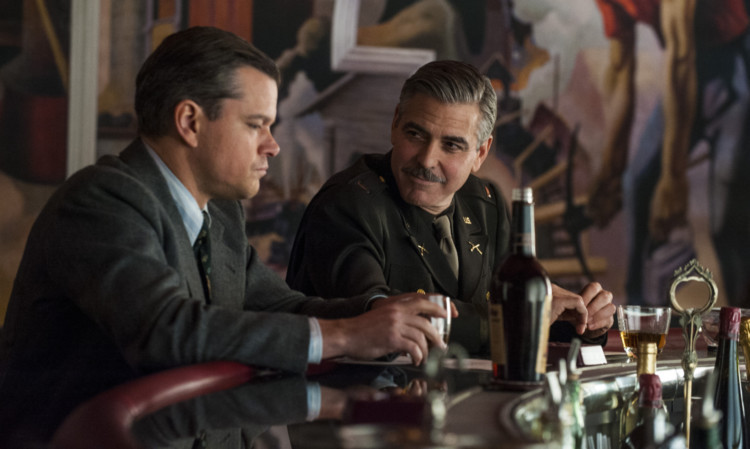
Is George Clooney losing his marbles?
George Clooney is vehemently anti-war. He briefly became America’s public enemy number one for taking a stance against the US-led invasion of Iraq, back when that flew in the face of popular opinion.
He has also worked tirelessly to bring an end to the civil war in Sudan, earning a Peace Award from the World Summit of Nobel Laureates and, in 2008, was appointed as a UN messenger of peace. But there was one simple reason he wanted to make war film The Monuments Men.
“It was the first time in the history of war that the victor didn’t keep the spoils,” he says.
The new film, which Clooney wrote, produced, directed and stars in, tells the true story of a platoon of Allied soldiers who were sent on a mission across France and Germany in the aftermath of the D-Day landings. Their orders were to recover the priceless works of art that had been pillaged by the Nazis as they ransacked their way across Europe at the start of the war and return them to their rightful owners.
“It wasn’t just that Hitler was trying to kill everyone and take their land, it was also that he was trying to destroy their culture and say that they didn’t exist,” George told me in the suitable surroundings of the National Gallery during a whistle-stop visit to London on Tuesday.
“I’ve seen that happen in other countries, Sudan for instance. It’s not enough to kill them, you have to destroy all of the markings that they left behind.
“The film asks ‘Is Art worth dying for?’ Well I don’t know a single inanimate object that’s worth dying for but if it means that they are going to erase my history, and the fact that I was here, then that’s very much worth dying for.”
George assembled an array of stars to make up his own platoon, including his Ocean’s trilogy buddy Matt Damon, Bill Murray, John Goodman and Cate Blanchett.
Although taken from a book on the exploits of the real soldiers, written by Robert Edsel, George changed the names of the characters so as to be able to take a bit of poetic license with them.
This is particularly the case with the only Brit, Donald Jeffries, who is played by Downton Abbey’s Hugh Bonneville. He’s depicted as an alcoholic academic in search of redemption when he joins the team, which has upset the family of Ronald Balfour, the scholar who was one of the original seven-strong team and one of two to be killed while carrying out their work.
“He wasn’t an alcoholic,” stresses George in that disarming manner that makes it difficult to be upset with him for long. “We wanted to change the names, even though some of them are pretty recognisable Rose Velon [who inspired Cate Blanchett’s character] was a hero to the French because we wanted to be able to tell a story much like most films do. We weren’t doing a documentary.
“We didn’t want to give any of these real men flaws that would be upsetting to their families. Most [historical] films do that, Lawrence of Arabia isn’t completely accurate but we still appreciate it.”
George also had to pick his way through a political minefield after answering a question from a Greek journalist prior to his visit to Britain about ownership of the Elgin marbles.
The collection of classical Greek marble sculptures was moved to Britain in the early 19th Century by the Earl of Elgin, Thomas Bruce while he served as British ambassador to the Ottoman Empire.
George’s acquiescence with the Greek view that they should be given back drew a curt response from John Whittingdale, chairman of the Culture, Media and Sport Committee, who put the 52-year-old’s ignorance on the matter down to his being “an American”.
“I did a little research to make sure I wasn’t completely out of my mind, and even in England the polling is in favour of returning the marbles,” the Hollywood star responded. “It’s one of those instances, like the bust of Nefertiti, you look at it and think that it would probably be the right thing to do to give it back.
“I know someone yesterday said, ‘He’s an American and he doesn’t understand’. Well he’s probably right but I do think it’s worth having an open discussion about.”
And with that he was off to Paris to, in his words, “somehow insult the Parisians about their Art, maybe tell them the Mona Lisa belongs to Italy.”
Now that would wipe the smile off a few faces.
The Verdict
Since his move into producing and directing, George Clooney has displayed some fine examples of his art Good Night And Good Luck and Argo to name two.
The Monuments Men is not his latest masterpiece. The story flits around like an out-of-control doodlebug, never allowing any of the characters to come to the fore, and the attempts at humour clang like an antique church bell. George says he wanted to change the names from the real Monuments Men as he didn’t want to make a documentary, but perhaps that would have been a better way of honouring their work.
Verdict 2/5

Enjoy the convenience of having The Sunday Post delivered as a digital ePaper straight to your smartphone, tablet or computer.
Subscribe for only £5.49 a month and enjoy all the benefits of the printed paper as a digital replica.
Subscribe